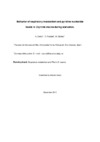Identificador persistente para citar o vincular este elemento:
https://accedacris.ulpgc.es/jspui/handle/10553/7757
| Título: | Behavior of respiratory metabolism and pyridine nucleotide levels in Oxyrrhis marina during starvation | Autores/as: | Osma, Natalia | Director/a : | Packard, Theodore T. Gómez, May |
Clasificación UNESCO: | 251001 Oceanografía biológica | Palabras clave: | Respiration ETS activity pyridine nucleotides NADt and NADPt Oxyrrhis marina |
Fecha de publicación: | 2010 | Proyectos: | Estudio de Un Nuevo Modelo Mecanistico Para El Metabolismo Del Zooplancton | Resumen: | Respiration in eukaryotes is a physiological process that occurs wherever the oxygen and organic matter are present. Respiration is oxygen consumption (RO2) catalyzed by the respiratory electron transport system (ETS) enzymes. The physiological RO2 rate depends directly on the enzymatic control of the respiratory ETS activity. According to Packard et al. (1996), we argue that substrate availability is the most probable regulatory mechanism controlling this activity. The major ETS substrates are the pyridine nucleotides (PNs) and they occur as nicotine adenine dinucleotide (NAD) and as nicotine adenine dinucleotide phosphate (NADP). Up to now, no studies have quantified their intracellular concentrations in a marine dinoflagellate. Oxyrrhis marina is a microheterotrophic marine dinoflagellate which has been widely investigated. Nevertheless, no study has characterized its respiratory metabolism from measurements of oxygen consumption (RO2) and ETS activity. For this reason, our main objectives were 1) to measure RO2 and ETS activity in O. marina and to determine their behavior during starvation, and 2) to quantify the PN levels during the same period. To achieve these objectives, we fed O. marina ad libitum and then we monitored the ETS, RO2, protein and PN levels for 17 days. | Facultad: | Facultad de Ciencias del Mar | URI: | https://accedacris.ulpgc.es/handle/10553/7757 | Derechos: | by-nc-nd |
| Colección: | Trabajo final de máster |
En el caso de que no encuentre el documento puede ser debido a que el centro o las/os autoras/es no autorizan su publicación. Si tiene verdadero interés en el contenido del mismo, puede dirigirse al director/a o directores/as del trabajo cuyos datos encontrará más arriba.
Vista completaVisitas
47
actualizado el 10-ene-2026
Descargas
31
actualizado el 10-ene-2026
Google ScholarTM
Verifica
Comparte
Exporta metadatos
Los elementos en ULPGC accedaCRIS están protegidos por derechos de autor con todos los derechos reservados, a menos que se indique lo contrario.
